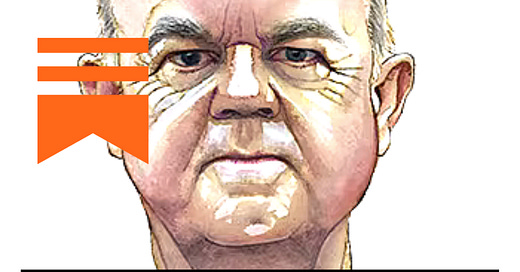Unveiling the Double Standards: Analysing the Insidious Hit Piece on Darius Guppy
The Contradictions and Bias Behind the Critique of "Hello!" Magazine's Exclusive Interview
Ian Hislop, the editor of Private Eye and a prominent commentator, has gained recognition for his penchant for sharp criticism of public figures and institutions. However, his article targeting Darius Guppy raises questions about the nature of Hislop's approach—it carries a distinct air of personal animosity rather than objective analysis. It is worth noting that Hislop himself has faced public scandals, including accusations of promoting misleading information. Given this context, doubts arise regarding Hislop's credibility and his ability to provide a genuine assessment of Guppy or if it is simply a surreal vendetta against him. These double standards undermine the integrity of Hislop's critique and warrant further scrutiny of his motivations.
Selective Emphasis:
There are seven pages devoted to Guppy's wife and new baby, and only one page to the man himself, but there is no doubt that he is the scoop.
Hislop’s hit piece1 emphasises the exclusive nature of the interview conducted by "Hello!" with Guppy2, as if it is a betrayal of journalistic integrity. However, it conveniently ignores that "Hello!" is known for featuring interviews with various public figures, including those who have faced legal troubles. This selective emphasis showcases the author's agenda to undermine Guppy's perspective while disregarding the magazine's regular practises.
Lack of Remorse:
In this reply, as in all the others, he makes no mention of remorse or regret. There is no suggestion that he might have done something wrong; no hint that although the tabloid press may have behaved badly, Darius Guppy has not exactly behaved well.
Hislop’s hit piece criticises Guppy for failing to express remorse or regret during the interview. While this may be a valid point, it conveniently overlooks the fact that tabloid press coverage often focuses on sensationalism and personal attacks rather than facilitating genuine expressions of remorse. The author fails to acknowledge the broader context that might have influenced Guppy's demeanour during the interview.
Absence of Balanced Reporting:
Sadly, there are no heartwarming pictures in the magazine of Guppy showing off his temporary new home. Perhaps the Prison authorities do not approve of that sort of thing.
The hit piece laments the absence of heart-warming pictures of Guppy's prison cell in the magazine, suggesting a lack of restraint on "Hello!"'s part. However, it fails to acknowledge that prison authorities might have restrictions on such photographs or that it is not customary for magazines like "Hello!" to feature prison imagery. This one-sided critique highlights the author's intent to paint a negative picture.
Accusations of Check-Book Journalism:
Talking of which, I do hope that Hello! has not paid Guppy any money for this piece.
The hit piece questions whether "Hello!" paid Guppy for the interview, raising concerns about cheque-book journalism. While it is essential to scrutinise unethical practises, the article assumes that Guppy was paid without any evidence. The author uses this assumption to cast doubt on the integrity of "Hello!" without considering the possibility that the magazine believed Guppy's story deserved attention.
Projection of Personal Bias:
No doubt they will be following this exclusive with others on the theme of miscarriage of justice. They might even try a convincing one.
Hislop’s hit piece concludes with a sarcastic prediction, insinuating that "Hello!" will continue to feature stories on miscarriages of justice, alongside unrelated celebrity content. This projection of personal bias suggests the author's disdain for the magazine's editorial choices and attempts to discredit any future articles that might challenge established narratives.
Conclusion:
Hislop’s hit piece on Darius Guppy exemplifies the insidiousness and double standards prevalent in certain forms of journalism. By selectively highlighting certain aspects, ignoring context, and projecting personal biases, the article attempts to undermine the credibility of both Guppy and the magazine that published the interview. It is crucial to critically examine such hit pieces and recognise the potential for bias and manipulation in media narratives.
I must be terribly careful writing in The Spectator about Darius Guppy. This magazine has twice printed pieces by Veronica Lodge (a pseudonym) about how badly Guppy has been treated by the press.
To gain a comprehensive understanding of the historical context and contrasting perspectives, it is essential to explore Ian Hislop's hit piece, as well as Darius Guppy's thought-provoking articles written under the pseudonym Veronica.3 4.




